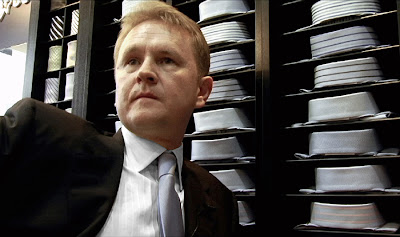Further, if the Russian people themselves were deluded by their government, so were we by our own, especially in how we were told about the horrors of growing up in Russia. Granted, this documentary, that covers the last generation of children to come of age under Communism and tracks them into adulthood, deals with a very bourgeoise group of kids/adults. I doubt that Russian's poor would find all that much in common with the lives on display here. Nor would America's poor, I suggest, discover a lot of similarity to most of our documentaries that deal with middle-class pursuits.
What Ms Hessman (pictured at right) has given us, in addition to a very interesting slice of personal histories, then and now, is an eye-opening look at what unites us despite -- maybe because of -- the pronoun-cements of our "great leaders." As do so many of the best films from (or that cover) for-eign soil, whether narrative or docu-mentary, this one slips us into the shoes of the other. You might say that My Perestroika makes Russians of us all. (All us middle-class viewers, at least.)
The filmmaker weaves present and past beautifully together via old footage and new, found photos and reminiscences that her subjects seem -- if not happy, at least -- willing to share. Lyuba (above) and her husband Borya (below, left) now teach at the same school in which they were pupils decades ago, while their son Mark (below, right) also attends there.
Andrei -- below, shown attending the grand opening of one of his exclusive men's shops, at which are sold only French shirts and ties -- is clearly the most "well-off" of the group. His "distance" is shown not only in his fairly luxuriant surroundings, but via his attitude on just about everything that's discussed here. (His "take" on voting should particularly resonate with today's Americans.)
Olga, below, always the prettiest girl in the class, has had one of those lives that seem to have peaked in or soon after school days; her story is in some ways the most depressing due to the extremes she has known. Yet she perseveres with resilience and something akin to spirit.
Remember the kid who was always the outsider? The one who would either remain that way or maybe blossom into some kind of creative computer genius. Ruslan (below, right) the last of Hessman's group seems to have remained dedicated to his music (he had a fairly successful band for several years) but now plays in subways, does the occasional nostalgia event and lives and works pretty much "off the books." He also has a son (below, left), and his quiet talk with the boy about "fitting in" and getting through the doludrums of schools days, is one of the film's highlights.
What we don't get from My Perestroka is any step-by-step progress through modern Russian history. If you've kept abreast at all, however, there is enough explanation here that you should have little trouble figuring things out and understanding the ideas and feeling of these five and their families, even if certain events seems a tad glossed over. (Were the supermarkets and stores, empty of food and clothing after the fall of Communism as Capitalism was haltingly embraced, really so easily worked around?)
Still, there's enough in this 87-minute movie to keep intelligent audiences glued to the screen and wondering, maybe for the first time, what it might have been like had they grown up Russian during the final quarter of the century past. My Perestroika, from International Film Circuit, opens this Wednesday, March 23, in New York at IFC Center. The film will also be playing around the country in a dozen major cities (and on one small island) in the months to come. Click here for dates and locations.
All photos above courtesy of Red Square Productions.












No comments:
Post a Comment